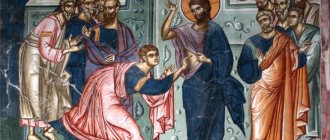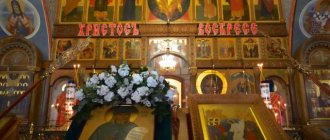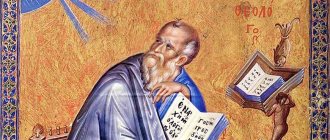Orthodox Life
There is probably no person on earth who does not dream of becoming happy. But everyone has their own idea of happiness. Some people see happiness in material wealth and wealth, some in success and popularity with others, some lack a soulmate to be happy, some need health...
According to the teachings of the holy fathers of the Church, true happiness for a person is hidden not in worldly joys, which can disappear in an instant, but in love for the Lord, which transforms the world around us.
For example, hardly anyone would dare to call the monks from Holy Mount Athos unhappy, and yet the monks are incredibly far from the pleasures of the world: abundant food, sound sleep, wealth and other components of “happiness” in the worldly sense.
We will tell you about 7 secrets of happiness of Athonite monks.
1. Faith in God
Of course, the very first secret of happiness of the Svyatogorsk monks is faith and love for the Lord. If a person can achieve this in his life, then nothing can make him unhappy.
One day a woman asked the Monk Porfiry Kavsokalivit why he called himself happy, because his health had seriously deteriorated. To this the saint replied: “Read the Holy Scriptures, go to church, have a confessor, partake of the Holy Mysteries - in a word, be a good Christian. Then you will find the joy you are looking for. You see that I am sick now, but I am happy. So you too, when you get a little closer to Christ, will find joy in your life,” said the monk.
2. Liberation from vanity and anxiety
The Monk Paisius the Svyatogorets advised that in order to feel happy, live a natural and simple life, in which there is no place for excessive luxury, vanity and unnecessary worries.
“Once a doctor from America came to my kaliva,” said the monk. “He told me about life there.” People there have already turned into machines - they devote whole days to work. Each family member should have their own car. In addition, at home, for everyone to feel comfortable, there should be four televisions. So come on - work, exhaust yourself, earn a lot of money, so that you can say later that you are comfortable and happy. But what does all this have to do with happiness? Such a life filled with mental anxiety with its non-stop race is not happiness, but hellish torment.”
3. A sober mind
Monk Simeon of Athos has a short parable that clearly illustrates that external circumstances do not in the least affect whether we feel happy or not. Salvation lies within ourselves, so we need to have a sober mind to withstand difficulties.
Here is this parable: “A man who could not swim floundered in the river in a panic. He raised a cloud of spray and waves ran down the river, which the man in fear mistook for a dangerous current. He began to fight the river waves. Finally, the drowning man figured out how to stay on the water and little by little swam to the shore. Having climbed out of the water, the swimmer looked back and saw that there was complete silence on the river, and he was constantly struggling with the waves and splashes that he himself created. All misfortunes begin with ourselves. But if you put things in order in your thoughts, these misfortunes will end for you.”
4. Pure heart
According to the words of Saint Nektarios of Aegina, the sure path to happiness is to have a pure, good-natured heart.
“Happiness is a pure heart, because such a heart becomes the throne of God. This is what the Lord says for those who have a pure heart: “I will dwell in them and walk in them; and I will be their God, and they will be My people” (2 Cor. 6:16). What else could they be missing? Nothing, truly nothing! Because they have in their hearts the greatest good - God Himself!
5. The ability to forgive
Forgiveness is one of the most important Christian virtues, therefore everyone who strives for happiness must learn to forgive their neighbor. Thanks to forgiveness, a person frees his heart from the burden of long-standing grievances, and a joyful heart is always happy. “This is our law: if you forgive, it means that the Lord has forgiven you too; and if you do not forgive your brother, then your sin remains with you,” said Silouan of Athos.
6. Give more than you take
In order to become happy yourself, you need to share joy and happiness with your neighbor. It seems that there is no secret in this, but according to the monk Simeon of Athos, this skill is the rarest among people, but whoever masters it becomes happy.
7. Be content with little
“Desires are the trash of the world,” said monk Simeon of Athos. Indeed, the more a person becomes fixated on his desires, the more immoderate his appetites become and, unable to get enough, the person dooms himself to unhappiness.
The Monk Pasisius the Holy Mountain advised to resist desires - with moderation.
“Happiness is found when you are content with little. What are people doing today? They buy... buy... buy things, cars, electronics and a bunch of other things and, naturally, they do not have enough money, and they are constantly in anxiety. You need to be content with little and not try to do too much, because if you have what you need and only what is necessary, you don’t need to work hard. Then they will have more time to sit at home with their children and family, do something, pray and, in general, be in family warmth and comfort, and not be in constant stress on the roads,” said the saint.
Foundation "Orthodox Heritage of Ukraine on Holy Mount Athos"
Teachings of the Elders
1
. Elder Joel argued that he who devotes himself to God has within himself a sacred fire, which is kindled by God Himself. Namely, he said this: “The strong desire to devote oneself to God requires so many sacrifices from a person that if a fire does not ignite in him, capable of burning out any carnal lust and any earthly desire, then this desire will not be supported and will be exhausted. I cannot kindle such a fire myself. No man has such strength to kindle such a fire that makes a young man 20-25 years old, i.e. a person with all the recklessness of youth, to despise any carnal lust and lust after suffering and deprivation. This fire can only be lit by One – God.”
2
. The following liturgical experience of Elder Jacob is especially interesting: “People are blind and do not see what is happening in the church during the Divine Liturgy. Once I served the Liturgy and could not make the Great Entrance because of what I saw. Suddenly I felt someone pushing me on the shoulder and leading me to the holy altar. I thought it was a psalm-reader. I turn around and see a huge wing placed on my shoulder by the Archangel and leading me to the great entrance. What happens in the altar during the Divine Liturgy! Often I can’t stand it and sit down, at which time my co-workers think that something is wrong with my health, but they don’t know what I see and hear.”
3
. The same elder said: “When the priest takes out the particles and remembers the names of the faithful at the holy altar, then the Angel of the Lord descends, takes this remembrance and carries it to the Throne of Christ, as a prayer for those who were commemorated.”
4
. The words of preachers usually remain unanswered, for there is a reason for this. Speaking about this, Elder Amphilochius emphasized the following: “Nowadays the words of preachers are adding fuel to the fire. Nowadays the poor and uneducated people are abandoned and unheard. He needs deeds and life according to Christian love, he wants to be sympathized with like brothers. Only through love for them and through acts of philanthropy will we bring our brothers to Christ again.”
5
. Elder Paisios emphasized: “One word of a humble person, confirmed by experience, coming out with pain from the depths of his heart, is of greater value than the empty chatter of a superficial person, quickly produced by his educated tongue, which does not provide food for the soul, for he is flesh, and not the fiery tongue of Holy Pentecost." He spoke about the accusatory sermon like this: “If a passionate person denounces an egoist, then it’s like hitting a stone with a stone, causing sparks to fly away! If a passionate person denounces a sensitive person, he will cause him a great wound. It’s the same as a savage using a healthy metal brush to clean pus from the eyes of an infant.”
6
. One bishop complained that his fiery preaching did not bear fruit. And Elder Jerome told him: “A hunter must be not just an excellent shooter. He must also load his gun with gunpowder and shot. Teach by example first, and then you will see how much fruit your preaching will bear.” And another time he emphasized: “When the preacher has not learned himself, has not passed the test himself, then how will he teach others? People, for the most part, learn by deeds, not by words.”
7
. Elder Epiphanius said: “The priesthood is God’s greatest blessing for people. It is a conduit of God’s grace.”
8
. To the archimandrite, who felt like a failure for not becoming a bishop, the same elder said: “This seems like blasphemy to me. If you think that these meager members can take bread and wine, and by the invocation of the Holy Spirit transform them into the Body and Blood of Christ, if you think that you have been given the power in Baptism to create from the descendants of Adam partakers of the Cross and the Resurrection of the Lord, if you think, that you have been given the power to lay your hands and stole on the head of the greatest sinner and release him from the confessional with a whitened soul, then how dare you, after all this, consider yourself a failure? Just because he didn't wear a miter? May God have mercy on us!”
4
. Defending the outer attire of the clergy, Elder Epiphanius said: “The priest is the embodiment of the absolute, the expression of the constant, unchanging and unshakable, the trumpet of heaven, the image of incorruptibility, the signpost of the path to eternity. Let his outer attire remain unchanged throughout the centuries, as a reminder and symbol of eternal and immutable truths, those truths that he represents.”
5
. “The cassock,” said Elder Amphilochius, “is the banner of our Church of Christ, therefore we must make great efforts so that we who wear it honor the cassock with our holy life, so that others who do not wear it will honor and respect it.”
11
. And Elder Philotheus spoke warmly about the cleric’s attire: “I am proud of the cassock that I wear, and I consider it more precious and splendid than any other robe, and even the royal purple and dress. I consider myself unworthy to wear such a modest, respectable and holy garment, which was revered by myriads of saints, saints, confessors and saints. I grieve and feel sorry for those clergy who take off their cassock and shave.”
12
. A shining example of a cleric who devoted himself to his work was Elder Epiphanius of Athens. We present here a few of his words addressed to the clergy: “I am completely landless. I don’t have an inch of my own land, although I am not from a poor family. I have no property, neither movable nor immovable, except for my modest, simple and unpretentious vestments, robes and books. The Lord had mercy on me, and even to this day I have not acquired a penny from the priesthood: neither payment nor remuneration for sacred rites.” “Let us not forget, married or unmarried, that we are representatives of the meek and lowly of heart Jesus. We are called to thrive in humility, not to quarrel at the altar over primacy.” “Clerics, and especially celibates, must be chosen from people of mature age, excellent upbringing, extreme reverence, brilliant behavior, adamantine character and harmonious mental make-up, acquired through labor and sweat, prayers and teachings, fasting and vigils, voluntary poverty, suffering and various deprivations. For the feat is the privilege and responsibility not only of monks, but also of every believer, and, above all, of the clergy, especially the celibate. The Orthodox Church is deeply ascetic, and whoever does not love heroism and is a friend of bliss and peace has no place in it.”
13
. Elder Daniel, summing up his words about the qualities necessary for a confessor, said: “First, he must have blessed patience towards those who sin and show great love. Secondly, he must keep the secret and prefer to die rather than reveal the sin of the person confessed to him. And thirdly, he must have as his faithful guide the virtue of reasoning.”
14
. A good confessor has compassion for those confessing. Elder Jacob spoke about this pain of his like this: “I have compassion for the person confessing to me. I'm sick with him. I am sick and crying for the confessor. I pray to Saint David that after confession I will forget what is unnecessary and remember what I need to pray for. I pray for those confessing, worry about them and wait for their arrival again.”
15
. The experienced confessor Elder Philotheus said: “I testify that often after confession, especially in big cities, although, incidentally, in villages, all day and most of the night I felt such exhaustion that I fell on my bed as if dead, thinking that I will no longer get up, but will die or be ill for a long time, remaining motionless and inactive. But when I woke up in the morning, I felt completely healthy and with new strength."
16
. Elder Epiphanius said: “For me there is no greater satisfaction than sitting for hours in the confessional and reconciling a person with God.”
17
. About young clerics who are impatient to become confessors, Elder Paisius said: “Those who are in a hurry to become confessors and still have a lot of spiritual poison in themselves are like unripe and tart quince, from which, no matter how much sugar we put in, will not make good jam, but if it works, it will quickly turn sour. Sweet words and great truths have value when they come from true lips, and find a place only in souls inclined to goodness and in generous people who have a pure mind.”
18
. About the activity of the confessor, Elder Philotheus said: “To the present evil generation, the confessor must apply oikonomia (condescension), for if he applies exactly the church canons, then there will be none of those confessing, or very few, worthy of Communion. But the confessor needs great attention and reasoning, and warm prayer to Heavenly God and Father, so that He will enlighten him on how to apply oikonomia.”
19
. The confessor must have extensive experience in order to be able to relate to people with pastoral responsiveness. Elder Porfiry, who became a confessor at the age of 21, said the following about himself: “Since at first I was inexperienced, I imposed heavy penances on the monks and laymen who came to confess. But many of them soon came to me again and said that they could not bear the penances I imposed. Now I see how heavy the penances I imposed were due to my inexperience.” And another time he said: “When I don’t eat anything, then I understand people’s souls better.”
20
. Regarding the economy that a confessor should apply, Elder Daniel advised: “In order for you, my confessor, to always be safe, do not be too lenient in condescension, nor be too demanding in severity, in order to preserve repentance in people. Tolerate questions and sins that are tolerable from the point of view of economics with great reasoning. But be very strict with those who are intolerant, so that you will not have to answer for them on the Day of Judgment.”
21
. Elder Jerome said that “the weakness of the priests is disgusting - the love of money. Alas, when the priest becomes a lover of money, then he will fall into many other things.” And he gave the young priest the following practical advice regarding his behavior: “When you leave the house and walk along the streets, wherever you go, know that people are watching the priest, how he walks, how he talks, how he behaves. May your actions be correct. Don't wave your arms back and forth. Wear a long cassock as expected. Sleeves should be wide. Conduct yourself prudently, in a Christian manner, and not frivolously, like the worldly.”
22
. Addressing his spiritual children, Elder Joel said: “You are using a very rare gift from God. You can find me whenever you want. I listen to you willingly, with love and tenderness. I'm in your pocket! Only when I leave will you understand what I am telling you now.”
23
. Elder Amphilochius with Fr. Patmos often said: “I am like an old tree, whose shade on hot summer days is enjoyed not only by the gentle sheep of Christ, but also by the little birds sitting on its branches. Everyone, in order not to lose their joy, wishes the old pine tree many years to come. But its roots are slowly rotting, and a harsh winter will come, when a strong wind will knock down the pine and it will become suitable only for firewood. But now the old pine thanks the sheep and birds - its comrades in the desert.” And another time he expressed his love as follows: “I, my children, don’t even want heaven without you.”
24
. The following words of Elder Epiphanius are worthy of mention and imitation: “My heart has only entrances. There are no exits. Whoever goes inside stays there. Whatever he has done, I love him as I loved him when he first came into my heart. I pray for him and seek his salvation.” “The worst torment for me is knowing that I have upset a loved one.” “I want those who are next to me to feel spaciousness, not crampedness. I don’t call anyone, I don’t hold anyone, and I don’t drive anyone away. Whoever wants comes, whoever wants, stays, whoever wants, leaves. I don’t consider anyone my follower or supporter.” “I sacrificed everything before I got this. I sacrificed my position as a university teacher. I sacrificed my position as senior secretary of the Holy Synod. I sacrificed my position as head of the missionary brotherhood. I sacrificed my position as rector of a large temple. I sacrificed episcopal thrones. I have one stole to confess ten souls. Nothing else!"
25
. Elder Joseph wrote to his spiritual child: “My strong desire, the burning of my heart, my divine love, constantly burning my insides, is for souls to be saved, for them to offer themselves as verbal sacrifices to our Sweetest Jesus.” And he prayed a lot for this to happen. But his words addressed to others do not bear fruit, or, at best, occasionally change the disposition of those listening. In this regard, the great Hesychast said: “If the grace of God does not enlighten a person, no matter how many words you say, there will be no benefit. Now he listens, but soon, tied up, he returns to the old way again. But if grace acts immediately, together with the word, then at that very second a change occurs in accordance with the person’s aspiration. From that moment his life changes. But this happens to those who have not damaged their hearing or hardened their conscience. On the contrary, those who hear good, but do not obey and remain with their evil will, even if you spoke to them day and night, and showed them all the wisdom of the Fathers, and performed miracles before their eyes, and turned back the flow of the Nile , they won't get one bit of benefit. But out of despondency, they want to come here to my kaliva (a kaliva on Athos is a separate house for a hermit; unlike a cell, there is no temple on a kaliva - Ed.) and talk for hours, just to kill time. Therefore, I close the door so that through silence and prayer I can benefit at least myself.”
26
. Elder Jacob said: “We all put on a cassock with the goal of sanctifying our soul. But attention is required. For worldly honor, glory, and selfishness can make it so that instead of sanctifying our soul, we lose it.”
27
. The world lies in evil. This should not lead us to despair. Elder Jerome emphasized: “Even if there are thousands of blind people and only one sighted person, he can lead them all out so that they do not die.”
28
. On one of the last days of his life, Elder Anthimus revealed to his nuns: “I would like to have the strength to do something more for my neighbor, but I cannot. I only pray and ask my Lord that in the days of my life here he will give me His grace, so that I can bring something to the one who comes to me: cross him, give advice, consolation, pray for him... Whoever is next to me will my friend: Jew, Turk, whatever. I want my Lord to vouchsafe me to help them in some way, as I have done all my life.” Of course, he had the same love for the nuns, his spiritual daughters: “I am your father,” he told them. “Despite my old age, I am not tired of pouring out my fatherly love on you. I am also trying to plant trees for you, grow gardens, build buildings for you, do everything I can for you, so that you are at peace, live peacefully and are provided with everything, and do not cry, weep or grieve when you lose me.”
29
. Many young clergy unthinkingly take on the spiritual leadership of their parishioners, having neither the required experience nor the humility to consult with more experienced priests. What is especially interesting is what Elder Paisios writes in his letters: “When an elder does not have much experience, but has great love and great humility, he really helps his spiritual children, using the experience of more experienced ones with whom he consults, and with the help of the grace of God , which he constantly receives for his great humility. But the minor, gathering novices to himself, shows his great pride, which has penetrated into him to the marrow of his bones. He is like a baby born with a long beard, and those who follow him show damage to his mind or heart. And priests who study psychology in order to help souls with human art are spiritually unhealthy. And it’s also surprising that their psychologist teachers do not believe in God or the soul, or think about it differently. By this, the clergy show that they are spiritually sick and need patristic examination, and when they become healthy, then they themselves will recognize this sick spirit and, at the same time, know the grace of God, so that in the future they can apply divine power to suffering souls, and not human art "
30
. Elder Porfiry said: “If I upset the bishop and he is angry with me, my prayer will not rise to heaven.” And another time he revealed a secret: “The All-Holy God, in order to help me do my work better and to bring more people to me, gave me the gift of seeing a little more.”
31
. The same elder, addressing his spiritual children, spoke about the advice he was giving: “What I am telling you, do not tell other people, for this is the right medicine for you, for your case. The same things for another person, even if he has outwardly the same symptoms as you, will not have the same beneficial effects on him.”
32
. The sanctified elders (meaning elders in holy orders - Ed.) combined the mystical life with missionary work. Elder Amphilochius spoke about this characteristically: “I do nothing else but sow the seed of monasticism and missionary work, albeit unskillfully. I pray to God that He will show a suitable agronomist who would scientifically cultivate what I sowed, without knowing the art of spiritual cultivation. I see that God is now showing that Patmos is a suitable place for a spiritual airfield.” And he added: “From the depths of Africa, sad voices are heard asking us for the light of Christianity and guides, so that they too can walk the holy path of Golgotha. We have no right to pretend to be deaf. We are obliged to extend our hand to these brothers of ours, who are so tired because they are far from the Orthodox Church. So, tap into your spiritual energy.”
33
. Elder Amphilochius offered something unique and very important for the spiritual procession of any believer and, especially, a sinner: “It is necessary that throughout Greece there be hospitals for sinners, where they can stay, in accordance with their mental trauma, for two or three months, and “When they have acquired Christian experience, let them begin their studies again with the good skills of these spiritual institutions.”
34
. As you know, in 1879 the Holy Synod unjustly exiled Elder Eusebius to the Paleokastritsa monastery on the island. Kerkyra. From there he kept in touch through letters with his godbrothers. In one of his letters he writes the following: “I very much desire, if I were free, to travel around cities and villages to teach, comfort and advise my suffering brothers, and impart to them the valuable and saving truths that I have learned by grace of the Lord."
35
. Elder Daniel several decades ago said something that is still valid today: “With deep sorrow we see that of the graduates of theological faculties, few are conductors of the light of Orthodoxy for the people, lamps of the Church. Why does this happen? Because the majority are vigilant in the study of science and do not show diligence in the exercise of virtues and philosophy according to God, which can make the soul chaste. They, attempting to fulfill their lofty mission with external wisdom, fail.” And he added: “The great Fathers and Teachers of the Church, on two wings: education and virtuous life, rose above the earthly and were initiated into the wonderful secrets of sacred theology, and thus preserved the verbal sheep of Christ from the idle talk of the slanderous heretics.”
36
. The thoughts of Elder Paisius about theology and theologians are interesting and very useful: “Theology is the word of God, which begins with immaculate, humble and spiritually reborn souls, and not the beautiful words of reason, which are created by philological art and expressed in a legal or secular spirit. Such words cannot converse with a person’s soul, just as a beautiful statue cannot converse, unless the listeners are very worldly and are content with simply beautiful conversations. Theology, taught as a science, usually examines things from the historical side and, as a result, understands them externally, and since there are no paternal deeds, internal experience, this theology is full of doubts and questions, for no one can understand divine actions with reason if first he will not struggle to survive them, so that divine grace may act in him.”
Eucharist
“I will build my Church, and the gates of hell will not prevail against it” (Matthew 16:18), says the Gospel. The Apostle says that the breaking of bread, that is, the Sacrament of the Eucharist, will be performed until the second coming of the Lord. The Monk Ephraim the Syrian says that the time will come when the Bloodless Sacrifice will cease. There seems to be a contradiction here, but no. We must understand this: open service in the church will not be performed, but the Sacrament of the Eucharist itself will continue until the second coming of the Savior (Rev. Nikon).
<<previous table of contents next>>
Insane
You write about your brother, who suffers from the mental illness of suspicion that the secret police are pursuing him everywhere and through everyone, so that he suspects the people closest to him of malicious intent and communication with the secret police. This mental illness occurred due to the fact that he was ashamed or simply did not want to repent in time for his childhood sins, considering them unimportant. But his conscience - an incorruptible judge - with its reproaches reminded him of the need to repent, suggesting that he was wrong, but guilty, and he, instead of repentance, turned the suggestion of conscience into persecution by the police. And the unbelief added to this and the long exclusion of oneself from communion with the Holy Mysteries further intensified the mental illness of unfounded suspicion. You're afraid he'll go crazy. But this is the mildest of evils and disasters. In this situation, at least his life will be preserved if he is in an institution for the insane, and that a person in madness is no longer responsible for what he does in such a situation. Of course, one cannot be irresponsible for the past. If you could manage to take your brother to St. Sergius and serve a prayer service with him in the caves before the miraculous icon of the Mother of God, called Chernigov, having first prepared a good confessor for your brother, then that would be good, because after the prayer service before this icon, those who are damaged in their minds they came to common sense and confessed well, and through this they were healed (St. Ambrose).
compiled by D. Gritsenko From the life of the elders (wisdom of the righteous) or soulful reading
A certain old man said: there was a maiden of very advanced years, who succeeded in the fear of God. I asked her what brought her to monastic life? She, interrupting her words with sighs, told me the following:
“My parents, dear husband, died when I was a child. The father was modest and of a quiet disposition, but of a weak and sickly constitution: he lived so immersed in concern for his salvation that hardly anyone from the inhabitants of the same village saw him from time to time. If sometimes he felt healthier, he would bring the fruits of his labors into the house; he spent most of his time fasting and suffering. His silence was such that those who did not know could consider him dumb.
On the contrary, my mother led an extremely absent-minded and so depraved life that there was no woman like her in the whole country. She was so prolific in speech that it seemed that her whole being was composed of one language. She constantly started quarrels with everyone, spent time drinking with the most intemperate men. She squandered everything belonging to the house; a very significant property did not satisfy our needs, and her father gave her control of the house.
She abused her body so much, desecrating it with impurities, that not many from this village could avoid having sexual intercourse with her. She was never subjected to the slightest pain, but from the day of birth until old age she enjoyed perfect health. This is how the life of my parents went.
My father, exhausted by a long illness, died. As soon as he died, the air darkened, it began to rain, lightning flashed, thunder roared, and the downpour continued continuously for three days and three nights. Due to such bad weather, his burial was delayed by three days, so that the villagers shook their heads and said in surprise: this man was so unpleasant to God that even the earth would not accept him for burial. But, so that his body would not be destroyed in the house itself, and thus would not make it impossible to stay in it, they buried him somehow, despite the fact that the bad weather and rain did not stop.
My mother, having received greater freedom after the death of her father, with great frenzy indulged in the abuse of her body and, having made our house a house of debauchery, spent her life in the greatest luxury and amusements. When her death came, she was honored with a magnificent burial; the very air seemed to take part in escorting her body. After her death, I remained in adolescence, and bodily lusts began to act in me.
One evening I began to think about whose life I should choose as a role model: whether it was my father, who lived modestly, quietly and abstinently, but throughout his entire life he did not see anything good for himself, spent it all in illness and sadness, and when he died, he the earth did not even accept his body; if such a residence was favorable to God, then for what reason was my father, who chose this residence, subjected to such disasters?
It is better to live as my mother lived, my thoughts told me, to indulge in lust, luxury, carnal voluptuousness. After all, my mother did not miss any bad deed! She spent her entire life drinking, enjoying her health and happiness. So, should I live like my mother lived? It is better to believe your own eyes and what is obvious, it is better to enjoy everything, than to believe the invisible and give up everything. When I, the accursed one, agreed in my soul to choose a life similar to the life of my mother, night came and I fell asleep. In a dream, someone tall and with a terrible look appeared to me; He looked at me menacingly, and he asked me angrily and sternly: “Confess to me the thoughts of your heart.” I, frightened by him, did not dare to look at him. In an even louder voice, he repeated the order for me to confess what kind of residence I liked. Confused with fear and forgetting all my thoughts, I said that I had no thoughts. But he reminded me of everything that I thought about in the secret of my soul. Convicted, I made requests, begging him to grant me forgiveness, and explained the reason for these thoughts. He said to me: “Go and see both your father and mother, then choose life according to your desire.” With these words, he grabbed me by the hand and dragged me. He led me to a large field of indescribable beauty, with many gardens and various fruit trees, and introduced me to these gardens. My father met me there, hugged me, kissed me, and called me his daughter. I took him into my arms and asked him to stay with him. He answered: “Nowadays this is impossible; but if you follow my steps, you will come here after a short time.” When I again began to ask to stay, the one who showed me the vision again grabbed me by the hand, pulled me and said: “Come, I will show you and your mother how she burns in fire, so that you know which of your parents lived by.” guide your life." Having placed me in a gloomy and dark house, where gnashing of teeth and grief live, he showed me a furnace burning with fire and boiling tar; some monsters stood at the mouth of the stove. I looked into the inside of the oven and saw my mother in it: she was mired up to her neck in fire, gnashing her teeth, burning with fire; a heavy stench spread from the never-ending worm. Seeing me, she exclaimed with sobs and called me her daughter: “Woe is me, my daughter! These sufferings are the consequences of my own deeds. Temperance and all virtues seemed to me worthy of ridicule; I thought that my life in voluptuousness and debauchery would never end; I did not recognize drunkenness and binge eating as sins. And so! I inherited Gehenna, suffered these executions for the brief enjoyment of sins; I pay for insignificant fun with terrible torment. This is the reward I receive for despising God! All sorts of endless calamities enveloped me! Now is the time for help! Now remember that you were suckled at my breast! Now repay me if you have ever received anything from me! Have mercy on me! This fire burns me, but does not burn me. Have mercy on me, my daughter, give me your hand and lead me out of this place.” When I refused to do this, fearing those terrible guards who stood there, she again began to scream with tears: “My daughter! help me. Do not despise the crying of your own mother! Remember my illnesses on your birthday! Don't despise me! I am perishing in the fire of Gehenna.” Her cry brought tears from me: I also began to moan, let out screams and sobs. These screams and sobs woke up my family; They took out a fire and asked me the reason for such loud groaning. I told them my vision. Then I chose to follow the life of my father, having been ascertained by the mercy of God what torments were in store for those who choose to lead a vicious life.”
Gospel
To fulfill the commandments of Christ, you need to know them. They are set out in the Gospel. Read the Holy Gospel, imbued with its spirit, make it the rule of your life, your reference book. In every action and matter of life, act in accordance with the teachings of the Gospel. This is the only light of our life (Rev. Nikon).
When I was still a hierodeacon, I really loved reading the Gospel. I was delighted with every word!.. What wonderful words in the Gospel... No matter what book you take, even from the best writer, if you read it many times, you may get tired of it. And the Gospel - the more you read it, the more you receive consolation and all sorts of good feelings (Rev. Nikon).
Every gospel narrative always has two meanings, two meanings: one external, understandable to everyone, and the other internal, deep, mysterious, not understandable to everyone (Rev. Nikon).
I was very upset by your reckless self-thinking regarding the Gospel, as if something could be said in the Gospel teaching that is not true. You give the reason that your long-standing desire and request is not being fulfilled, contrary to what is supposedly said in the Gospel: ask and it will be given to you. Therefore, you are the fool of fools, and your reckless opinion is nothing more than delusion from the charms of the enemy, the beginning of which was your own pride, which, although for a time it was covered with the guise of external humility, but finally showed its great trouble. Think for yourself. How great is the pride: if our request is not fulfilled, then it turns out that there may be something wrong in the Gospel teaching. This saddens me all the more because, I remember, I already wrote to you about this the word of Saint Climacus, Degree 26, section 60, where he says: “everyone who asks God for something and does not accept it, of course, according to some of these The reasons for this are not received: either because they ask ahead of time, or not according to their dignity and with vanity; either because, having received what they asked, they would have become proud, or because, having fulfilled their desire, they would have fallen into negligence”... humble yourself, leave your madness, and for this sin, over the course of 40 days, make 15 bows with the prayer: “Lord, forgive my madness and sin!” (Venerable Ambrose).
I advise you to read the Gospel more often and for a long time, especially from John. Read so that only your ears hear: you understand - you don’t understand, read. The blessed word of the Gospel will greatly drive away boredom and despondency and will calm you down, just read more and longer, recognizing such temptation as God’s permission to test you and to discover the inner hidden deposit in order to try to heal the hidden illness of the soul with the Gospel remedy indicated by the Lord Himself, who says: “ Learn from Me, for I am gentle and lowly in heart, and you will find rest for your souls.”
(Matt. 11:29). The Lord and through the Apostle says: “Vengeance is mine, I will repay” (Rom. 12:19); that is, leave everything to the Lord, and the Lord will reward you in a way that you are not able to reward, even if you wanted to (Venerable Ambrose).
Positive aspects of spiritual development
If you have become interested in the concept of spiritual growth, this is an important time in your life. And if you are wondering how to begin to develop spiritually, then you have taken a big step towards a happy and harmonious existence.
To be a truly spiritual person, you need to work on yourself, train spirituality, like any skill you need to master. How exactly to train? The best approach is to try to solve the problems of people around you, including those that interfere with their development.
When you start doing this, you will immediately “kill several birds with one stone.” You will begin to believe in yourself and your abilities more. You will get closer to people and be able to make new friends. You will begin to become more aware of the reality around you and understand what your place is in it. Of course, there will be difficulties. But if you see them as additional opportunities for spiritual growth, you will benefit from them. After all, difficulties show your weak points, which means you understand where to direct your efforts, where to build up your spiritual armor.
Spiritual growth will help you become an internally calm and holistic person, teach you unconditional love for others, and help you believe in yourself. All this will be very useful on your life path. If your spiritual growth proceeds consistently and steadily, no troubles or problems will break you. You can always draw strength from believing in yourself and loving the world. Where another person breaks down and gives up, you will only become stronger.
Eldership in Russia
On Holy Athos, eldership is treated as an amazing sacrament , the phenomenon of which has not yet been solved. How can one person combine so much wisdom and light?
There is no elder without a novice, but it is customary to choose a spiritual mentor long and carefully , one for life. Sometimes it takes several years before a spiritual mentor takes on such responsibility. Both the future novice and the elder look closely at their friend for a long time, becoming convinced of the correctness of their intentions.
is like a father to a believer : you need to listen to him, honor him and respect him.
A novice may disagree with the elder’s instructions, but he has no right to contradict them. The will of the spiritual mentor for the novice is equal to God’s will, because the Lord himself guides their relationship. If monasticism is usually called the vanguard of Orthodoxy, then eldership is the “advanced line” of monastic obedience . This title is impossible to obtain: an elder is called an elder by people who come for advice and spiritual help. That is why every word of the elder is imbued with wisdom, and his instructions rarely go unheeded.
Basics of spiritual development
- AdoptionAcceptance means that you do not fight with yourself or with others. You live and let live. You allow the world to be as it is, you accept that other people may not live up to your expectations.
- Mindfulness When you are mindful, you live in the here and now. You don't miss the past or worry about the future. For you, only the present moment exists, you live it to the fullest possible extent. You are in touch with your emotions and understand why they are the way they are.
- Peace of mind Peace of mind comes when your body, soul and spirit are in harmony and balance. They agree with each other, there is no conflict between them.
- Unconditional love Unconditional love means that you love (a person, people or the whole world) without making demands or conditions, without trying to get something. You forget about your ego, your needs and just experience love.
- Faith Faith comes to you when you learn a certain truth and accept it.
Concept of spiritual development
First, let's figure out what spiritual growth is. It happens only when you establish contact with your soul and begin to hear your inner voice. You may find it difficult to achieve this at first. We advise you to set aside time for yourself every day, find an opportunity to be alone with yourself. Then this process will go faster. Over time, you will feel that you have come to harmony with yourself and the world. You will discover a source of strength within yourself that will allow you to live a fuller and happier life, and become the master of your destiny.
This way you can better know and understand yourself, your strengths and weaknesses, and learn to accept yourself. Spiritual growth means that you will be a harmonious person whose body, mind and soul live in harmony and strive for common goals. You should not think that the desire for spiritual growth will make you a person “not of this world,” a “black sheep,” or that you will have to give up your usual activities and constantly meditate in the lotus position. These are common misconceptions.
It is no less erroneous to believe that in order to resolve the question “How to begin to develop spiritually?” you will have to live according to the rules and commandments of any religion. The process of spiritual development does not mean that you will certainly come to God and become a believer.
Of course, we do not want to say that religion should not have a place in your life. There are people whom it really helps to grow spiritually. But in general, spiritual growth is the process of increasing your awareness and understanding of exactly what kind of person you are. It gives a clue to your inner being, which you may not yet be at all familiar with.








